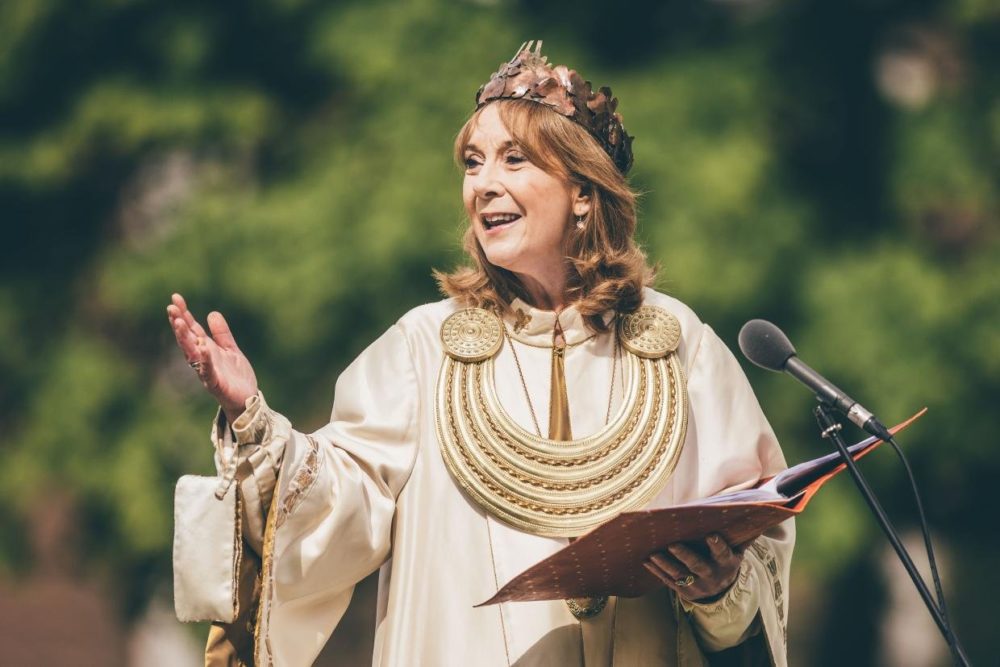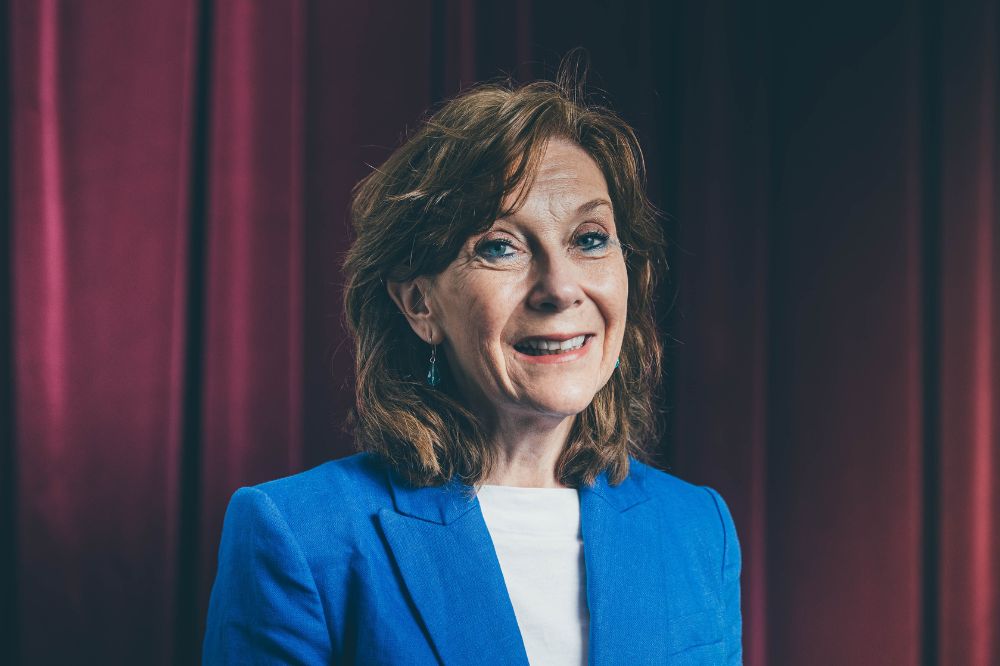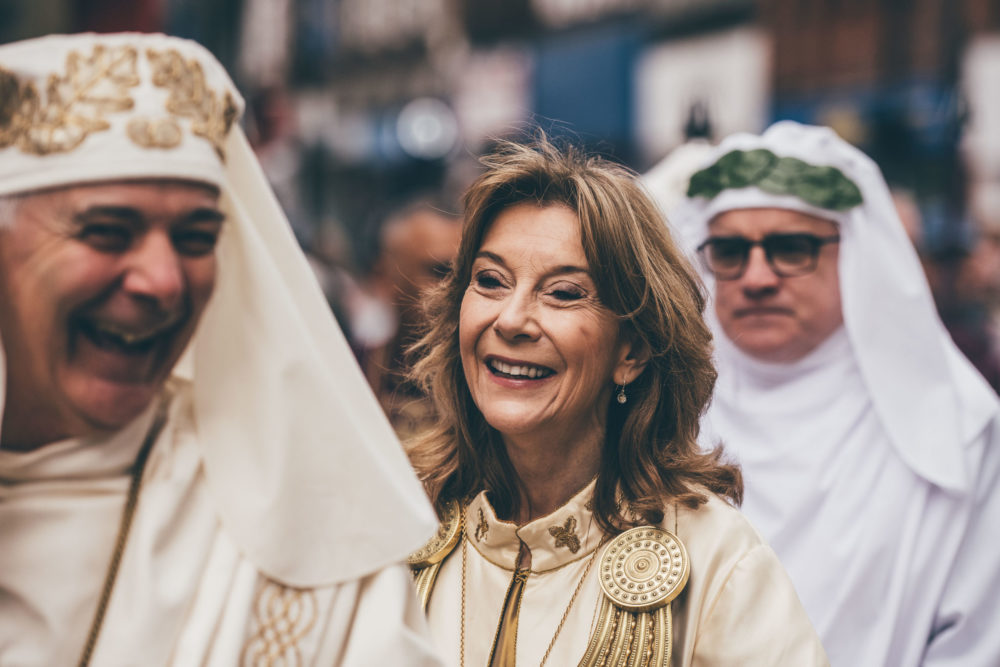Archdruid calls for bridges to be built in stirring Eisteddfod speech

Stephen Price
Archdruid Mererid Hopwood gave a stirring speech at the first Gorsedd gathering at the National Eisteddfod, Rhondda Cynon Taf today – calling for bridges to be built between communities, and re-christening Welsh learners as ‘new speakers’.
Beginning with a self-composed poem, she shared her joy at being in the “superbly beautiful” Parc Ynys Angharad which hosts Wales’ Maes this year.
In a nod to the importance of Pontypridd, the birthplace of our national anthem, she described Hen Wlad fy Nhadau as an apt summary of one of the Gorsedd’s main aims: “to work together to make sure our language lives on.”
Chair, Crown and Prose winner
Award-winning poet Mererid Hopwood holds the position of Archdruid for the period from 2024-27.
The Archdruid is elected for a term of three Eisteddfodau and the incumbent is responsible for conducting the Gorsedd ceremonies during Eisteddfod week.
Mererid Hopwood is best known to the Eisteddfod audience as the first woman to win the Eisteddfod Chair, at the Denbighshire Eisteddfod in 2001.

She is one of a select group of poets and writers who have bridged the gap between poetry and prose, winning the Chair, the Crown and the Prose Medal.
Her collection of poems, Nes Draw, won the Book of the Year poetry award in 2016.
Mererid Hopwood served as the Welsh-language Children’s Laureate and received the Tir na nÓg award for one of her novels for children in 2018.
She is one of the honorary presidents of the Waldo Williams Society. In her work, she is Professor in the Department of Welsh and Celtic Studies at Aberystwyth University and is also the secretary of the Welsh Peace Academy.
Born in Cardiff, she was educated at Ysgol Llanhari, which lies within the 2024 Eisteddfod catchment area.
Eisteddfod speech
In her fist speech as Archdruid, Hopwood calls for Welsh to ‘live on’ and not be ‘preserved’.
She said: “The aim is not to keep her in a jar of sour vinegar, but rather to live her – sweet on speakers’ lips. And in this sense, we’re especially pleased to be able to welcome very many new speakers to join us this year.
“‘New speakers’ – again, please note – not ‘learners’. I chose my words carefully. After all, we’re all language learners – life long.
“I shall certainly be leaving these valleys with a richer vocabulary – what about ‘mysgu’ for untangling? And somebody I spoke to yesterday had learnt the word ‘tyle’ for a ‘path up the hill’.
“After decades of shortsighted regimes who have promoted uniformity, we have at last started to see how important variety is – for a civilised world and a healthy planet.
“Keeping the Welsh language alive is a contribution to the effort of keeping that essential variety alive. And part of keeping a language alive is to have conversations in it. And so here’s some homework for us all.
“For those of us who are starting on the language journey with a nervous ‘helo – hon-a-hon/hwn-a-hwn dw i’: go for it, use it, speak it! For those who are confident, fluent speakers, slow down and listen! Remember that every voice seeks a listener.
“Two hundred and ten years ago – to this week, 1814 on the Maen Chwŷf, the rocking stone on the common, one voice that we would have heard would be that of the complex, colourful character – Iolo Morganwg, who covered the blade of a sword and challenged the poets to write on the theme: Adferiad Heddwch – the Restoration of Peace.
“That word, ‘restoration’ is interesting. It reminds us, contrary to a belief held by so many, that we’re not instinctively warmakers. Our natural state is to live in peace.
“The notion of ‘restoring peace’ suggests that peace does exist – the challenge is finding it; but without setting out deliberately to look for it, we’ll never find it; and while the rumours of authority insist on whispering about ‘preparing for war’, this task of finding peace is even more difficult.
“Prepare for peace – that’s the headline we need these days.
“But that’s a challenging headline. Too challenging perhaps. Preparing for peace means that we must look at the world in a different way, have different priorities, spend our money on different things – not on weapons but on the arts, education and fair play.”

Call for peace
Testament to her skills as both a writer and orator, she continued: “And part of the preparing for peace is to call for it. As we place the sword in its sheath this week, we will be calling for peace. And that call needs to be heard on the streets of this island – and in our world today.
“On Thursday, we had a Gorsedd rehearsal, and on the way home, I stopped in Aberdare and bought a watch. I have one minute more.
“I shall use it to thank the people of this area for the guidance they have given us now and throughout the decades. You see, we have come to the area where in 1861 the Eisteddfod as we know it began, and to an area that has the sort of priorities that puts choir conductors on plinths.
“Go to Aberdare square to see Caradog, Griffith Rhys Jones, the blacksmith and musician immortalized in a statue, and think of him uniting four hundred and fifty voices in a choir that defeated all other choirs.
“I don’t know what the fate of the conductors and competitors of this Eisteddfod will be, but plinth or no plinth, we must thank you all – and indeed thank everyone who has prepared for our national cultural festival this year.
In a nod to recent world events, and those closer to home, she added: “Whether we go home with or without a cup, let us remember the words of Paul Robeson, the world-famous bass who loved these valleys: we are all, he said, are brothers and sisters because of our music.
“Sensing the shadow of the old bridge, pont y tŷ pridd, upon us this morning, let’s remember that in order to get to that peace we long for, bridges must be built, and that our music, our art and our language can create colourful and diverse bridges between us – on this Eisteddfod Maes, in Wales and in the world.”
Support our Nation today
For the price of a cup of coffee a month you can help us create an independent, not-for-profit, national news service for the people of Wales, by the people of Wales.






Good speech, as you would expect
from her.
‘New speakers’ has already begun to catch on as the term to describe adult learners, but it’s good to get that kind of endorsement.